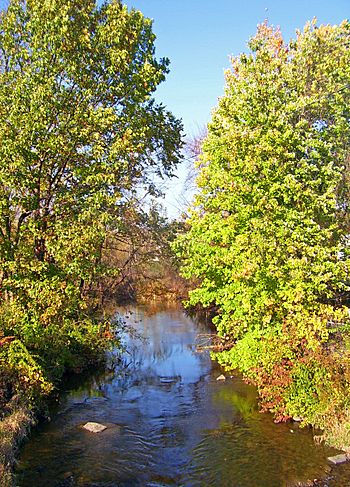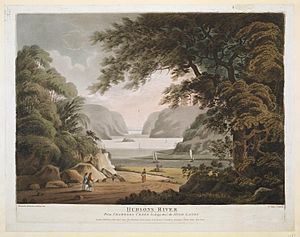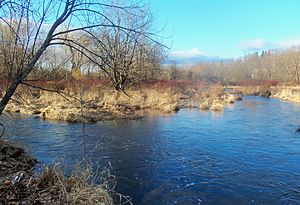Quassaick Creek facts for kids
Quick facts for kids Quassaick Creek |
|
|---|---|

Creek along the Newburgh city-town line
|
|
| Other name(s) | Quassaic Creek |
| Country | United States |
| State | New York |
| Counties | Orange, Ulster |
| Municipality | Town of Plattekill, Town of Newburgh, City of Newburgh, Town of New Windsor |
| Physical characteristics | |
| Main source | E of Tuckers Corner 680 ft (210 m) 41°39′45″N 74°01′34″W / 41.66250°N 74.02611°W |
| River mouth | Hudson River 0 ft (0 m) 41°29′16″N 74°00′26″W / 41.48778°N 74.00722°W |
| Basin features | |
| Tributaries |
|
Quassaick Creek is a cool stream in New York State. It's also called Quassaic Creek on some maps. The name comes from an old Algonquian word meaning "stony brook."
This creek is about 18.4-mile-long (29.6 km). It flows into the big Hudson River. You can find it in Orange and Ulster counties. The creek starts in hilly areas west of the Hudson River. It begins near the towns of Plattekill and Marlborough.
From there, it flows south through the Town of Newburgh. Then it reaches the City of Newburgh. The creek even forms part of the border between Newburgh and New Windsor. Finally, it empties into the Hudson River.
Quassaick Creek was one of the first places where Europeans settled in the Newburgh area. Many mills and factories were built along its banks. The creek's water was used to power these industries. Because of this, parts of the creek were dammed, creating lakes. One important lake is Chadwick Lake, which provides water for the Town of Newburgh.
Sadly, all this industry caused a lot of pollution in the 1900s. But people worked hard to clean up the creek. Now, local groups want to create parks and trails along the lower part of the creek.
Contents
Where the Creek Flows
The Quassaick Creek starts on the western side of a long, hilly area called Marlboro Mountain. This is near a small place called Tuckers Corners in Ulster County. The creek flows downhill through wet, swampy areas and small ponds. It goes south and a bit west.
Journey Through Towns
Just south of the village of Plattekill, the creek reaches the border of Orange County. It then quickly turns west back into Ulster County. Here, it goes under its first main road, NY 32. After that, it turns south again, flowing next to Old Mill Road, the New York State Thruway, and Route 32. It then crosses back into Orange County.
Chadwick Lake: A Water Source
About two miles (3 km) further south, the creek opens up into Chadwick Lake. This lake was built in 1926. At first, it was a private lake for fun activities. But in 1962, the Town of Newburgh bought it. Now, it's the main water supply for the town. Chadwick Lake is also a town park with trails and a playground.
Flowing Towards the Hudson
After the dam at Chadwick Lake, NY 300 crosses the creek. The creek continues to flow south, staying near Route 300. In this area, more homes and buildings appear along the creek. North of Newburgh's Town Hall, the creek crosses Route 300 again. It then turns east, flowing next to Gardnertown Road for almost a mile. This leads to Algonquin Park, which is owned by the county.
In the wet areas at the park's southeast corner, the Quassaick Creek meets Bushfield Creek. Bushfield Creek is its biggest and only named tributary (a smaller stream that flows into a larger one). The creek then goes under NY 52 and into another lake, Winona Lake. This lake gives its name to the nearby suburban area.
From Winona Lake, the creek flows under Interstate 84 to Brookside Pond. This area is mostly undeveloped and is just outside the City of Newburgh. The water from Brookside Pond then turns east. It forms the border between the City of Newburgh and the Town of Newburgh. Here, NY 17K crosses over it.
A short distance later, the creek enters Harrison Pond. Then it turns east into the city, crossing NY 207. It flows next to Route 17K through a wooded area. The creek is then dammed again to create Muchattoes Lake. This lake is in the middle of a housing project built in the 1970s. The creek crosses under Route 32 again. Then it gets wider and becomes the border between the city and the town of New Windsor. A short distance later, after crossing under US 9W, the creek drops its last 100 feet (31 m) into the Hudson River. It meets the Hudson near a large oil terminal.
Creek's Past
In 1709, more than 50 German Palatines (people from Germany) came to live along the north side of the creek. They settled near the Hudson River. Queen Anne of Great Britain encouraged them to move there. These settlers were the first people to live in what is now Newburgh. As a reward for their hard work, each person, including children, was given 50 acres (20 hectares) of land by the British king. Today, there are no signs left of this early settlement.
Industrial Growth
As Newburgh grew, the creek became very important. It helped power mills that ground grain. Later, it powered factories. Development spread far upstream along the creek. At what is now Algonquin Park, a very large gunpowder factory was built. People at the time said it was the biggest in the country. Today, this area is known as the Orange Mill Historic District. Some of the old stone buildings are still standing.
Cleaning Up the Creek
For many years, factories along the creek in Newburgh freely dumped their waste into the water. This caused a lot of pollution. In 1984, a lawyer named Robert F. Kennedy, Jr. learned about the pollution. He decided to find out who was polluting the creek and take legal action.
Kennedy and a friend walked along the lower seven miles (11 km) of the creek. They took notes and photos of the pollution. They even swam in the ponds to collect water samples. They found many illegal pipes from companies. Eventually, they found 24 different sources of pollution. They sued 16 different companies under the federal Clean Water Act. All these companies agreed to clean up the lower Quassaick Creek.
Kennedy later said this experience was a big moment for him. It made him realize that protecting the environment is like fighting for social justice. He felt it was about keeping public resources safe from special interests. Since then, the creek has become much cleaner. Now, local people are planning to create parks and ways for everyone to enjoy the creek.
 | William Lucy |
 | Charles Hayes |
 | Cleveland Robinson |



